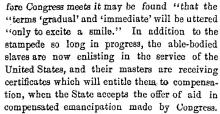A singular controversy seems to be in progress in Maryland, between the “Union” men and the “Unconditional Union” men. Both parties, as it seems, agree that emancipation in Maryland has become a necessity. All wish heartily that slavery were out of the way, and are willing to agree to measures for being rid of it. One of the wings of the great Union party, however, holds a more advanced position than the other, respecting this question. One believes in immediate emancipation, and the other in some sort of gradual process. All are ready, it is states, to join in Governor Bradford’s plan for a State convention, and all anticipate a general assent to the measures finally agreed upon; but still they differ in opinion as to the proper course to be pursued, and hence comes a newspaper warfare, with cards of explanation, charges, replies, and all the usual incidents of political division.
Meantime, it is interesting to see, the subject matter of the controversy is disposing of itself. Practically matters are moving on so rapidly that, as the Baltimore American assures us, before Congress meets it may be found “that the terms ‘gradual’ and ‘immediate’ will be uttered “only to excite a smile.” In addition to the stampede so long in progress, the able-bodies slaves are now enlisting in the service of the United States, and their masters are receiving certificates which will entitle them to compensation, when the State accepts the offer of aid in compensated emancipation made by Congress. The price of negro recruits thus obtained being set at $300, the masters obtain quite as much in this way as it seems likely that they will get if they take the daily increasing risk of loss by escape; and so slavery in Maryland is said to be fast melting away. The system is reduced to such straits, the paper before named assures us, that “pretty much all that remains to do is “merely to perform some sort of requiem or “dirge over its remains.”
This singularly unpractical quarrel, over a matter which is fast ceasing to be worth quarreling about, is not unlike the greater disputes which divided many true friends of the Union. The controversy still goes on as to the legal grounds of emancipation, the effect of the proclamation and its authority. Meanwhile, however, slavery itself is perishing by no slow process. The proclamation is a dead letter and accomplishes the freedom of no slaves— says one; but meantime, by the attrition of war, the system against which the proclamation is directed is crumbling away. The right of the insurgent States to maintain slavery after the return of peace, is a theme of constant discussion with another; and yet as affairs now go, there will soon be no slaves to be kept in slavery. “While: we sleep the grass grows.” While we sleep the grass grows.” While the loyal are discussing such points, -one would say out of pure love of abstractions, -- the great question of the time is settling itself. The inevitable march of events is taking away from amounting us the subject of our chief controversies, and disposing of the vast problem, at which human power stumbles and fails, in such form as suits the great designs of an all-wise Providence.
Boston (MA) Daily Advertiser, September 29, 1863, p. 2.

